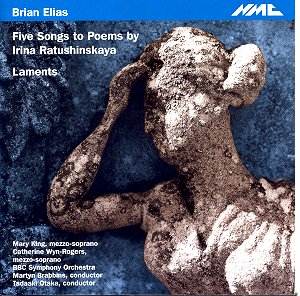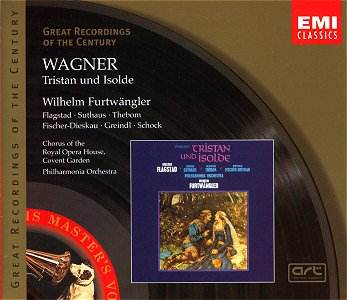 Composer: Brian ELIAS (born 1948)
Composer: Brian ELIAS (born 1948)
Works: Five Songs to Poems by Irina Ratushinskaya (1989), Laments (1998)
Performers: Mary King (mezzo-soprano), Catherine Wyn-Rogers (mezzo-soprano)², BBC Symphony Orchestra, conducted by Martyn Brabbins, Tadaaki Otaka²
Recorded: BBC Studio 1, Maida Vale, London, December 1997; Live, Royal Festival Hall, London, November 1999
Label: NMC D 064
Duration: 54:25
In this commendable NMC release, we encounter the profound artistry of Brian Elias through two major works that encapsulate his nuanced approach to setting text and exploring emotional landscapes. The coupling of Five Songs to Poems by Irina Ratushinskaya and Laments provides not only an engaging listening experience but also a vital window into the composer’s thematic preoccupations—the interplay of personal history and broader cultural narratives.
Five Songs is a striking cycle, completed in 1989, that derives its power from the evocative poetry of the dissident Russian poet Irina Ratushinskaya. Elias’s choice to present these songs without breaks reveals a symphonic cohesiveness, allowing the listener to traverse the emotional arc seamlessly. The first song, with its urgent depiction of anticipation prior to arrest, showcases Elias’s deftness in manipulating musical tension. The use of dissonance and rhythmic irregularities reflects the psychological turmoil of the poet’s experience, effectively capturing the ambivalence of hope amidst fear.
The second song adopts a more straightforward, balladic character, contrasting with the somber gravitas of the first. Here, Elias’s melodic line flows with a lyrical grace that serves to underline the poignancy of Ratushinskaya’s imagery. The third song, a slow lament, employs a broader harmonic palette, with the orchestration subtly amplifying the emotional weight. The use of descending melodic lines evokes a sense of mourning, leading seamlessly into the violent textures of the fourth song, where tolling bells punctuate the chaotic soundscape.
In contrast, the final song returns to a more reflective mood, capturing the innocence of childhood yet tinged with a sense of loss. This cyclical return to simplicity underscores Elias’s mastery of thematic development and emotional resonance. The performances by Mary King and Catherine Wyn-Rogers exhibit commendable sensitivity; their contrasting timbres enrich the emotional fabric of the work, while the BBC Symphony Orchestra under Martyn Brabbins navigates the demanding orchestration with aplomb.
Laments, completed in 1998 and dedicated to the memory of Elias’s mother, is a deeply personal work that draws on the tradition of Mediterranean mourning practices. Setting texts in Grico, a dialect with roots in both Greek and Italian, Elias crafts a ritualistic atmosphere that evokes the communal nature of grief. The alternation between the mezzo-soprano and the semi-chorus creates a dialogue that reflects both individual and collective mourning.
The first song’s alternating textures are particularly effective in illustrating the tension between solitude and solidarity in lamentation. The second song’s poignant climax, where the chorus joins the soloist, amplifies the emotional stakes, culminating in a cathartic release that resonates with the listener. The final song introduces a lighter mood, a departure that provides relief from the preceding weightiness while remaining firmly rooted in the themes of remembrance and solace.
Both performances exhibit a commendable technical facility and interpretative depth. The BBC Symphony Orchestra’s nuanced playing, particularly in the orchestral interludes, serves as a crucial underpinning for the vocal lines, enhancing the overall emotional landscape without overwhelming the soloists.
From an engineering standpoint, the recording quality is exemplary, capturing the subtle shades of Elias’s orchestration and the intimate vocal textures with clarity. The audience’s silence during the performance of Laments speaks volumes about the profound impact of the music, allowing for an immersive experience that invites contemplation.
In the broader context of contemporary classical music, Elias’s work remains underappreciated, despite its intricate craftsmanship and emotional depth. This release is a significant step toward rectifying that oversight, offering a compelling entry point into his oeuvre. The scarcity of recordings of Elias’s music renders this release all the more valuable—it not only showcases his artistic voice but also contributes to the ongoing discourse surrounding the intersections of personal and cultural identity in music.
In conclusion, this NMC release serves as both a celebration and a re-evaluation of Brian Elias’s contributions to the contemporary classical canon. Through careful attention to the text and an intimate understanding of the emotions at play, Elias emerges as a composer whose works deserve a more prominent place in the concert repertoire. This recording is a testament to that potential, inviting listeners to engage with the rich emotional landscapes that Elias so masterfully constructs.


